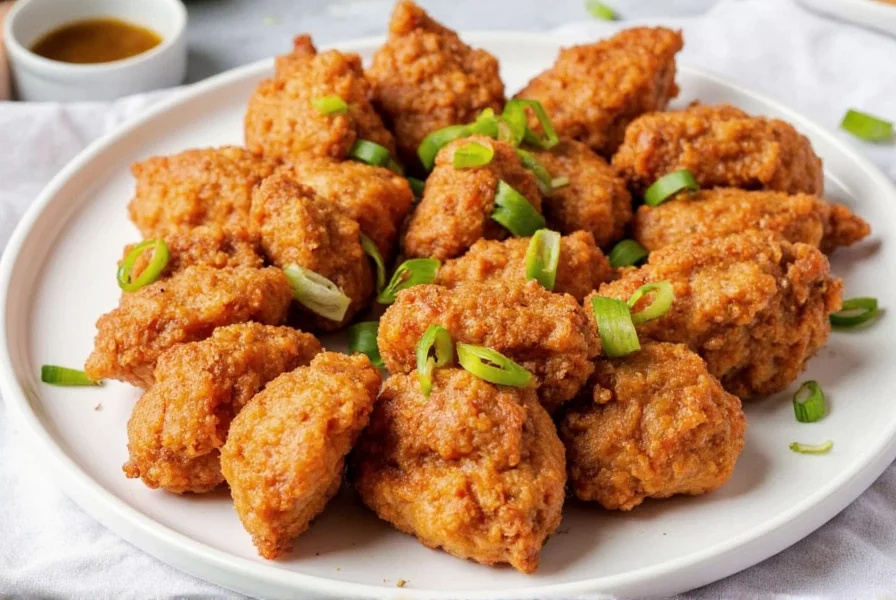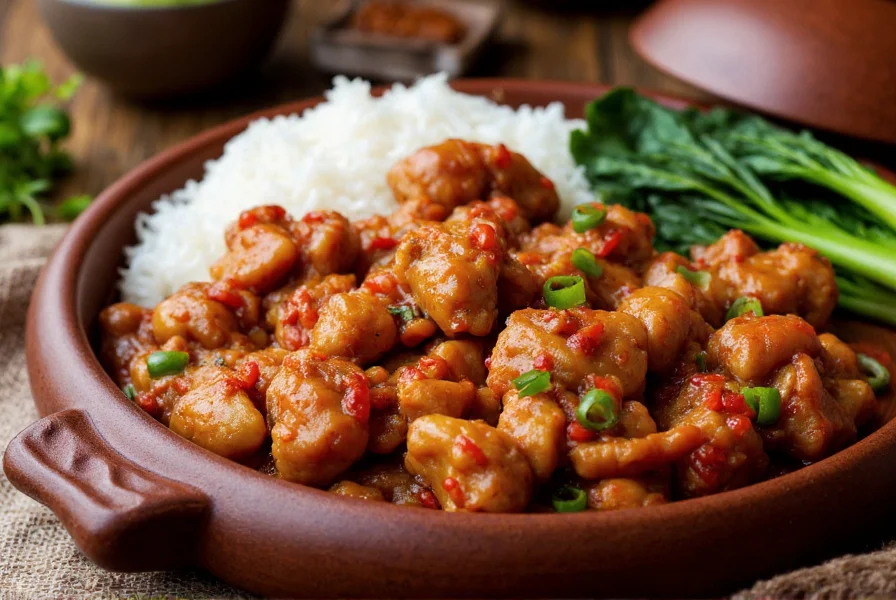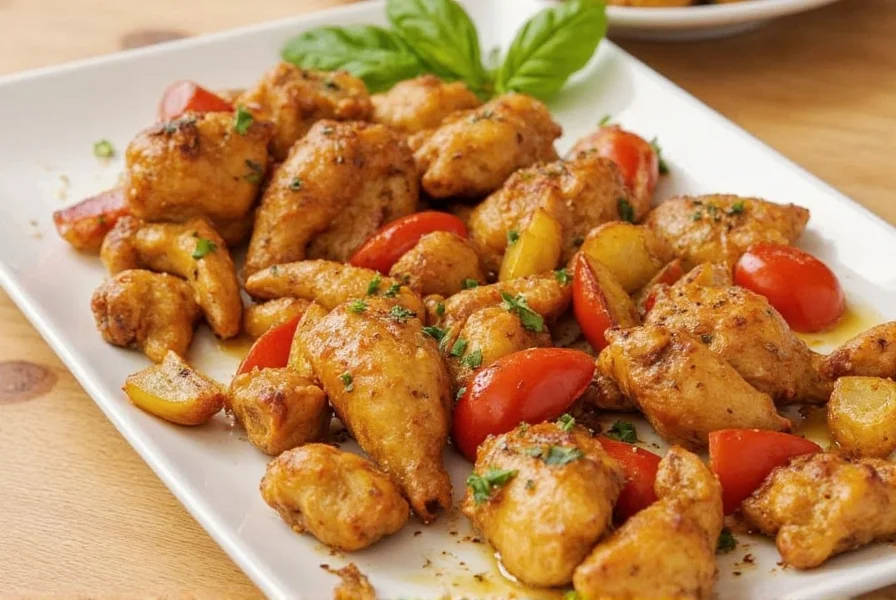The Origins of Salty Pepper Chicken
Salty pepper chicken emerged from Cantonese culinary traditions but gained widespread popularity in Chinese-American restaurants during the late 20th century. While similar dishes exist in mainland China (particularly in Fujian province), the Americanized version typically features more pronounced seasoning and a crispier texture that appeals to Western palates. The dish showcases how Chinese cooking principles adapt to local ingredients and preferences while maintaining core flavor profiles.
Essential Ingredients for Authentic Flavor
The magic of perfect salty pepper chicken lies in ingredient quality and proper technique. Unlike many Chinese-American dishes that rely on sauce-heavy preparations, this recipe celebrates simplicity with minimal ingredients that must shine.
| Ingredient | Why It Matters | Pro Tip |
|---|---|---|
| Chicken thighs | Higher fat content prevents drying during frying | Skin-on provides extra crispiness but can be removed for lighter version |
| Coarse sea salt | Larger crystals provide texture and controlled salinity | Never substitute table salt which dissolves too quickly |
| Freshly cracked black pepper | Vibrant flavor compared to pre-ground pepper | Use Tellicherry peppercorns for best results |
| Cornstarch | Creates ultra-crisp exterior without heavy batter | Mix with a small amount of potato starch for extra crunch |
Step-by-Step Preparation Guide
Mastering how to make salty pepper chicken requires attention to temperature control and timing. The double-fry technique separates adequate versions from exceptional ones.
Marinating the Chicken
Cut 1.5 pounds of boneless, skinless chicken thighs into 1.5-inch pieces. Combine with 1 tablespoon Shaoxing wine, 1 teaspoon grated ginger, and 1/2 teaspoon white pepper. Refrigerate for 30-60 minutes. Proper marinating infuses flavor without overpowering the delicate chicken.
The Double-Fry Technique
This critical method ensures perfectly crisp salty pepper chicken every time:
- First fry: Heat oil to 325°F (163°C). Coat chicken in 1/2 cup cornstarch and fry for 3-4 minutes until lightly golden. Remove and drain.
- Cooling period: Let chicken rest for 5 minutes to allow moisture to retreat from surface.
- Second fry: Increase oil temperature to 375°F (190°C). Refry chicken for 60-90 seconds until deeply golden and ultra-crisp.
Creating the Signature Seasoning
While chicken fries, prepare the salty pepper mixture: combine 1.5 teaspoons coarse sea salt and 2 teaspoons freshly cracked black pepper. For authentic Chinese salty pepper chicken, add 2 minced garlic cloves and 1 finely sliced scallion. The precise salt-to-pepper ratio makes the difference between bland and extraordinary.

Common Mistakes to Avoid
Even experienced home cooks make these errors when preparing salty pepper chicken vs black pepper chicken:
- Using pre-ground pepper - Loses essential volatile oils that provide complex flavor
- Skipping the double-fry - Results in greasy, unevenly cooked chicken
- Adding seasoning before frying - Causes burning and bitter flavors
- Overcrowding the fryer - Lowers oil temperature and prevents proper crisping
Variations Across Regions
Salty pepper chicken adapts beautifully to different culinary traditions:
- Hong Kong style - Includes five-spice powder in the seasoning blend
- Taiwanese version - Often incorporates basil leaves for herbal notes
- Chinese-American restaurant style - Typically features more pronounced saltiness and crispiness
- Health-conscious adaptation - Air-fried version maintains flavor with less oil
Serving Suggestions and Pairings
This versatile dish pairs perfectly with:
- Steamed jasmine rice to balance the bold seasoning
- Crisp cucumber salad for refreshing contrast
- Light vegetable stir-fry to complete the meal
- Cold lager or dry Riesling to cut through the richness
For best results with your salty pepper chicken recipe, serve immediately after preparation while the coating remains crisp. The dish doesn't reheat well due to moisture absorption, so portion carefully.

Storage and Reheating Guidelines
If you must store leftovers (though this dish is best eaten fresh), follow these tips:
- Store in airtight container with paper towel to absorb moisture
- Consume within 24 hours for acceptable quality
- Reheat in air fryer at 350°F for 3-4 minutes (never microwave)
- Avoid refrigerating while still hot to prevent condensation
Frequently Asked Questions
What's the difference between salty pepper chicken and black pepper chicken?
Salty pepper chicken features a dry seasoning blend of coarse salt and freshly cracked black pepper applied after frying, creating a crispy, textured coating. Black pepper chicken uses a sauce-based preparation with black pepper as the dominant flavor but includes soy sauce, oyster sauce, and other liquids. The texture and flavor delivery differ significantly between these two popular Chinese dishes.
Can I make salty pepper chicken without deep frying?
Yes, you can adapt the recipe for air frying or baking. For air frying, cook at 400°F for 12-15 minutes, flipping halfway. The texture won't be identical to double-fried versions but will still deliver the signature salty pepper flavor. Baking requires coating chicken with oil spray first and baking at 425°F until crispy (about 20 minutes). Both methods work well for a healthier salty pepper chicken recipe.
Why does my salty pepper chicken turn out soggy?
Sogginess typically occurs when oil temperature drops during frying (from overcrowding the pot) or when seasoning is applied too early. Always maintain proper oil temperature (325°F for first fry, 375°F for second), don't overcrowd the fryer, and toss the chicken in the salty pepper mixture immediately after the final fry while the surface is still hot and dry.
What's the best type of pepper to use for authentic flavor?
Tellicherry black peppercorns provide the most complex flavor profile for salty pepper chicken. Their larger size and maturity yield nuanced notes of fruit and floral elements beyond simple heat. Always grind fresh just before use, as pre-ground pepper loses 70% of its volatile flavor compounds within 15 minutes. The pepper should be freshly cracked to medium-coarse consistency for optimal texture and flavor release.
Can I use chicken breast instead of thighs for salty pepper chicken?
You can use chicken breast, but thighs work better due to higher fat content which prevents drying during the double-fry process. If using breast, cut into larger pieces (2 inches), marinate longer (60-90 minutes), and reduce first fry time by 30 seconds. Breast meat requires more careful temperature control to maintain tenderness in this best salty pepper chicken recipe.











 浙公网安备
33010002000092号
浙公网安备
33010002000092号 浙B2-20120091-4
浙B2-20120091-4